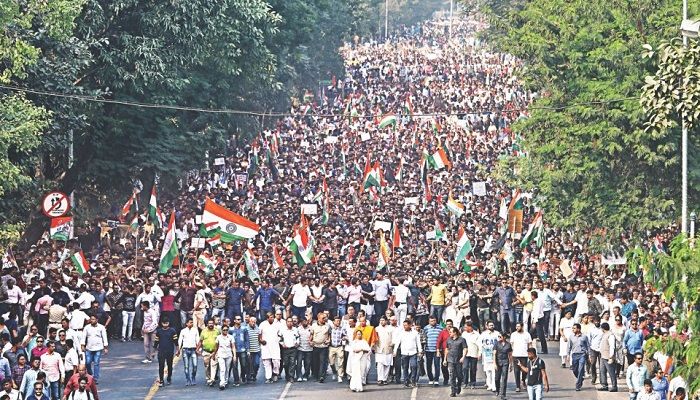
Desk Report
Publish: 17 Dec 2019, 10:50 am
Divisive Citizenship Law:

Mamata Banerjee, the Chief Minister of West Bengal, and her party supporters attend a protest march against the new citizenship law and the National Register of Citizens (NRC) in Kolkata, India, yesterday. PHOTO: REUTERS
Protests against the newly amended citizenship legislation slammed as anti-Muslim spread to new areas of India and escalated in several other regions, with about 120 reported injured in New Delhi and Aligarh.
Police clashed with protesters in Delhi, Lucknow, Chennai and Bangalore where students tried to storm a police station, hurling volleys of stones at officers cowering behind a wall.
The scaled-up protests saw West Bengal Chief Minister Mamata Banerjee leading a four-km street march in Kolkata in the east and arch political rivals CPI(M) and the Congress sharing the dais in Kerala capital Thiruvananthapuram in the south, another state whose government has opposed the citizenship law.
Speaking at the joint protest meeting, Kerala Chief Minister Pinarayi Vijayan said India is facing a severe crisis deliberately created by the central government.

Kerala’s finance minister Thomas Isaac tweeted: ''United action of all secular force is the need of the hour.''
In Kolkata, thousands gathered for a major demonstration called by Mamata Banerjee, a firebrand opponent of Modi.
''We will never allow NRC and CAA in Bengal. No one will be ousted from the state. The CAA and the NRC will happen over my dead body. We believe in coexistence of all religions, caste and creed,'' Mamata said vowing to continue agitation against CAA and NRC till they are withdrawn.
She appealed to protesters to shun violence and read out an ‘oath’ for her party workers during the mega rally at Jorashanko, five days after arson and violent protests were witnessed in several parts of the state.
Prime Minister Narendra Modi described the violence on Sunday evening during protests as deeply distressing at the Jamia Millia Islamia University against the citizenship law.
Damaging public property and disturbing normal life had not been part of the country’s ethos, he said in a series of tweets yesterday.
Modi’s tweets came a day after protests against the law escalated at two universities - Jamia Millia Islamia in Delhi and the Aligarh Muslim University (AMU) in Uttar Pradesh. The police have been accused of using excessive force to control both the protests, which left scores of students injured and property damaged.
The Indian Supreme Court disapproved of the violence during the Jamia students protest against the citizenship law.
''Rioting must stop and there should be peace,'' Chief Justice of India S A Bobde said responding to a request to take note of police action on students at Jamia Millia Islamia University and Aligarh Muslim University. The apex court will hear the case today.
Congress General Secretary Priyanka Gandhi Vadra led a two-hour symbolic silent protest near the landmark India Gate to show solidarity with the students of Jamia Millia Islamia and said ''the country’s atmosphere is bad. Police are entering university to beat up students. The government has tinkered with the Constitution. We will fight for the Constitution.''
In solidarity with the students of Jamia Millia and AMU, students of Hyderabad’s Maulana Azad Urdu University, Jadavpur University in Kolkata and the Banaras Hindu University in Varanasi took out protest marches on Sunday night, reports our New Delhi correspondent.
Senior Congress leader Jairam Ramesh has challenged the Citizenship Amendment Act (CAA) in the Supreme Court and his plea will be heard on Wednesday.
WEEKEND OF VIOLENCE
Protests were also reported in Mumbai, Hyderabad, Patna and Raipur over the weekend.
Authorities in northern Uttar Pradesh, meanwhile, have cut internet access in western parts of the state, which has a sizable Muslim population, following demonstrations in Aligarh.
The epicentre of the protests has been in India’s far-flung northeastern states, long a seething and violent melting pot of ethnic tensions.
On Sunday night in Assam state -- following days of rioting and clashes with police -- around 6,000 people protested, with no major incidents reported, reports AFP.
Curfew was relaxed in Guwahati for 15 hours from 6:00am yesterday, Assam Police Chief Public Relations Officer Rajiv Saikia said. Night curfew in the city, however, will remain in force, he said.
In Dibrugarh district, curfew has been eased from 6:00am to 8:00pm.
Protests were held in Mumbai’s Indian Institute of Technology and Tata Institute of Social Sciences overnight and more were planned at Bombay University and in the southern city of Bengaluru yesterday.
Some Bollywood celebrities like actress Konkona Sen Sharma, and directors Mahesh Bhatt and Anubhav Sinha, also criticized the police action on Twitter and called on others to speak up, reports Reuters.
Mamata’s main political rival in West Bengal the Bharatiya Janata Party also took out a street march from Garia to Jadavpur in south Kolkata celebrating the changed citizenship law and at one point broke police barricades following a brief skirmish before proceeding further.
Subscribe Shampratik Deshkal Youtube Channel
© 2024 Shampratik Deshkal All Rights Reserved. Design & Developed By Root Soft Bangladesh